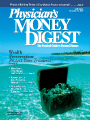Make Sense of the Mutual Fund Scandal
In the bull market of the 1990s,investment decisions were often nobrainers.This is no longer true.Similarly, mutual funds have longbeen considered the Mr. Clean of theinvestment world—a quick and safe wayto diversify your investments. That, too,unfortunately, has changed.
New York Times
In recent months, New York attorneygeneral Eliot Spitzer, Massachusettsregulators, and the SEC have gone afterseveral fund firms for allowing illegallytimed trades. One of the first to feel theheat was Putnam Investments, the country'sfifth largest mutual fund company.The impact of the suit filed by state andfederal regulators was immediate. A report notes that in the10 days following the filing, investorshad withdrawn $3.9 billion from stockfunds that the company managed. Inaddition, public pension investors hadwithdrawn almost $6 billion.
Big Fish, Big Net
Times
The allegations and revelations didn'tstop there. The reports thatRichard Strong, founder of Strong FinancialCorporation, had been tradingin and out of his company's funds in amanner that might have cost shareholdershundreds of thousands of dollars.Strong has since stepped down from hisposition as chairman of the board andagreed to repay investors for any losseshe may have caused. The company's reputation,however, may suffer long-term.
Shortly thereafter, Alliance CapitalManagement dismissed two of its seniorexecutives—John Carifa, president, chiefoperating officer, and chairman of thecompany's mutual funds; and MichaelLaughlin, chairman of the company's mutualfund distribution unit—for allowingthe market timing of mutual fund shares.
Times
And as recently as mid-November,securities regulators began investigatingmore than two dozen brokers at a unitof J. P. Morgan Chase to determine ifthey improperly sold mutual funds togenerate increased commissions. At thesame time, about a dozen of the brokers'supervisors are also under scrutiny,according to the article.
Kiplinger's
One of the main allegations in themutual fund scandal centers on markettiming. According to an article in, mutual funds set their shareprices once a day, based on the 4 PMEastern time closing prices of their holdings.Trades placed after 4 PM are supposedto be accounted for in the nextday's closing price. However, a growingnumber of firms have been accused ofpermitting select investors to buy or sellshares of a fund at its 4 PM closing pricelater the same day. Attorney generalSpitzer has likened the practice as effectivelybetting on a horse race after therace has been run.
NewYork Times
However, not everyone agrees withthe focus of Spitzer's and the SEC's investigation.According to a separate article, many believe thatstale pricing rather than market timing isthe main source of the mutual fundindustry's problem. The article offers thefollowing price-lag example:
"If a fund owns shares in an Asiancompany that announces poor resultsafter the market closes there, at 2 AMEastern time, the fund price [posted thefollowing morning in the United States]may not incorporate the news, eventhough it's an excellent bet the price inAsia is headed down. Not surprisingly,traders see money to be made by takingadvantage of the price lags."
Lessons Learned?
New York Times
Regardless of the source of the problem,one thing that's clear is that changeis on the way. And there's no shortage ofopinions on how to change the mutualfund industry. A articlenotes that the SEC plans to overhaul theregulation of the industry by adoptingmeasures restraining abusive trading,clarifying conflicts of interest rules, andcompelling better disclosure on fees.
Forbes
Writing in , John C. Bogle,founder of The Vanguard Group, believesthat government assistance is needed tocorrect the situation. He notes that theInvestment Company Act of 1940 statesthat funds should be run for the benefit ofinvestors, not insiders. Bogle calls foramending the act and establishing a federalstandard of fiduciary duty on the partof fund directors and officers.
"We need to empower directors bybuttressing their independence," Boglesays. "The chairman of the fund's boardshould be independent of the companydoing the stock picking. It offends commonsense to have the fund's chairmannegotiating fees with the manager's chairman—when they are the same person."
Despite the image and misconductbeating that the mutual fund industry iscurrently taking, investors have not beendeterred from pouring money into theirfunds of choice. According to AMG DataServices, investors plowed $24.5 billioninto stock mutual funds this past October,the largest amount since March 2002, upfrom $17.3 billion in September.
Time and more shakeouts will providea clearer picture of how the industryweathers this storm.
